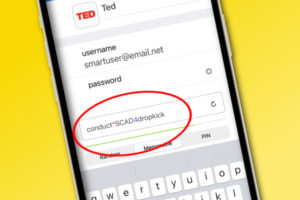Last year my husband and I gifted our two older kids with their own iPod and Kindle, and along with the devices came a contract that outlined our expectations for using them. As my friends have started getting wifi-connected tablets or phones for their kids, these contracts have been a big topic of discussion.
So, we’ve pooled our collective ideas to share the top 10 things to we’ve considered before writing a cell phone contract for our kids. It really does help us start on the same page with our kids when it comes to how they use tech. And having less confusion and disagreement with a tween or teen in your home is a really good thing.
We hope they’ll help you too!
Related: How to know if your child is ready for a cell phone: 5 questions to ask yourself
1. Will you set parental controls?
Kristen has some helpful tips for making an iPod touch safe for kids, and parental controls like these are definitely something to consider as you get your kids their first device. You can limit phone numbers, app downloads, and usage hours. You can even remove apps — like Safari or Chrome — that give them access to info you don’t want them to have without restriction.
Spend some time on the device before you give it to them, getting comfortable with how the parental controls work. (Personally, I find the iOS built-in controls to be pretty comprehensive and easy to understand, even if you aren’t techy.) Android has decent options too, like Google Play Store app parental controls. Of course, there are also third-party apps for extra protection, like Kids Place Parental Control or a paid service like Screentime.
2. Will you limit when and where they can use it?
Consider whether or not you’ll limit when and where your kids can use their devices. For example, my kids aren’t allowed to have their devices on at the dinner table or in their bedrooms in the evening. And they’re off completely on Sundays, for no-screen family time.
I have friends who won’t allow their kids to bring devices to siblings’ sports events, because they want them cheering their brothers or sisters on. And others who think that’s the perfect time, because it keeps them happy so they can watch the game.
Also, decide if this policy applies to your kids’ friends when they’re at your house too, because you want to be ready if they show up for a sleepover with a FaceTime-armed iPad in their sleepover bag. While your contract can’t necessarily apply to other kids, you can outline the expectation that gadgets will be checked at the door for parties and sleepovers (and let parents know that too).

3. Who’s responsible if they break or lose it?
An iPad or phone is an expensive piece of equipment for a child to maintain, so you need to be clear about who’s responsible for repairing or replacing the device if your child breaks or loses it. Do you own the gadget and they’re renting it from you? Or do they have full ownership (which would mean they’d need to fix if they broke it).
A good compromise is to go ahead and provide protection up front — like a great screen protector (like the one from Otterbox above) and iPad case — then let kids know it’s on them if they break it.
You can even check with your insurance company to see what kind of rider they might offer to cover devices. Ours is around $8 per month, which is something your child might be able to pay with their allowance.
Related: How to find the right first cell phone for your kid
4. What are your expectations about their cell phone etiquette?
Cell phone and email etiquette is something our kids need to be taught. Before you hand them their own device, do you have expectations about how they’ll answer the phone, how quickly they should return a call, or how to exit (or avoid) group texts? Do they know when it’s appropriate to Facetime someone? Or should they text first before hitting the call button?
Also, it’s important to decide what the expectations will be when you call (or text) versus a friend. For us, calls (and even texts) from friends can go to voicemail if our kids are busy, but if it’s us calling, they need to pause what they’re doing and pick up.
And, because cell phones have cameras these days (yep, even the old flip phones do), it’s imperative you discuss how they will be able to use that feature. Are you okay with them taking photos and videos of others without their permission? Are they clear that photos, videos, text messages, and emails they create and share could then be shared without their permission to other people and yes, even on the Internet?
Before you hand over the gadget, make sure your kids are going to be good digital citizens, and are clear on the consequences if they make bad choices, especially when it comes to teens. Yes, colleges and employers are looking at social media accounts.
5. What kind of access can they have to social media or the internet?
Most social media sites require kids to be thirteen before they can set up their own account, and probably for good reason. Social media can be tricky business for kids. Consider what kind of access you’ll give them to these sites, and how you’ll monitor their activity. And if you let them set up accounts, talk through Facebook and Instagram privacy and safety tips so they’ll have a safer online experience.
Some of us require that our kids share their passwords with us at all times, and they know we’ll be checking. That said, there are a million ways for kids to get around this, including secret accounts or sneaky apps. In our experience, the very best way to make sure your kids are being safe is to keep talking with them about what’s happening online. Knowing they have a safe place to talk about these issues is the best protection.
7. What safety rules or monitoring will you put in place?
Having hard-to-figure-out passwords and smart WIFI restrictions will make it harder for your kids to stumble onto questionable content you don’t want them seeing. We’ve seen hilarious photos on Pinterest where the parents change their WIFI password every day, and the kids can receive it only when their chores are done. Brilliant.
Parents love Circle by Disney for managing screen time, as well as the Bark app (above) to see what are kids are looking at on their devices. I really like that you can monitor several kids in one place, and that it identifies possible threats of cyber bullying or risky behavior.
Related: Expert Internet safety tips for parents you can start doing right now.
8. How do you want them to respond to alarming info or interactions?
There’s a good chance your kids will encounter information that could be potentially alarming to them, from inappropriate photos to mean comments, and perhaps other behaviors that are more serious. Talk with them about what you’d want them to do if they see something like this.
In our experience, it’s important to let them know that they can come to you with anything they’ve seen, without judgment.
9. How will you check on them and follow through with consequences?
If there’s no follow through on the contract, then it probably wasn’t worth taking the time to create in the first place. So, outline what you’ll be doing to check their activity, and what the consequences will be if they break the rules. Will you be taking their phone away for a specific amount of time? Will they lose access to certain apps? Ask yourselves these questions and be as specific as you can in your contract.
Related: How to hide YouTube comments.
10. Why did you get them the device in the first place?
When I wrote my contract for my kids, I made sure that one of my rules was for them to fun with their devices. Hey, I love to use mine too. They can learn, create, and be inspired by the things they do and read, so I really want them to minimize mindless time, and challenge themselves to be better people because of their gadgets.
If you’re tech averse and are reluctantly giving them a device, it could be harder for them to hear your perspective (and your rules). Creating a cell phone contract can actually be a way for you and your child to bond in a positive way, and perhaps give them the opportunity to show you why they’re so excited about their new gadget. And allow you to show them that you’re engaged in what they’re interested in, too.
Related: Put screen time management in your kids’ hands with the free unGlue app








To control his screen time, we use a parental control app – Kidslox. I think that it is a great solution. We explained to our kid why we want to use it and he didn’t rail against. I think that similar apps are a very good solution for screen time management. He knows that when the granted time runs out, there is no need to argue, he switches to different activities. I like it very much.